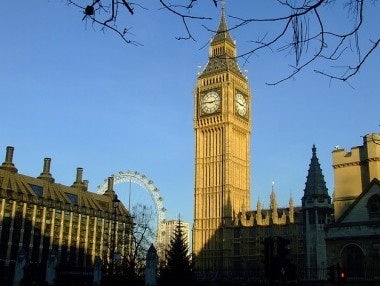Only Around 127,000 Chinese Tourists Visited UK In 2010, Fraction Of 3 Million To EU#

Chinese tourists are increasingly going to the UK, but many are skipping it for France, Germany or Italy (Image via Flickr user TJ Morris)
A difficult and often inefficient visa system, payment problems and poor product tailoring: these, according to a new report by the University of London's School of Oriental and African Studies (SOAS) commissioned by Hilton Hotels & Resorts, are just two of the issues curtailing a potentially massive influx of Chinese outbound tourists to the UK. According to the report, entitled "How the Rise in Chinese Tourism will Change the Face of the European Travel Industry," only around 127,000 Chinese tourists traveled to the UK last year, in stark contrast to the 3 million who visited Europe. This puts the United Kingdom far behind the estimated 500,000-700,000 annual Chinese visitors to France, Germany and Italy, although VisitBritain, the UK government’s tourism agency, does expect the number of Chinese visitors to the UK to reach 240,000 within the next three years.
Among the hangups limiting efforts by the UK tourism industry to attract more Chinese tourists include the fact that the United Kingdom is not part of the Schengen agreement, which makes it far more difficult and inefficient for Chinese visitors to obtain visas. Whereas a Schengen visa allows Chinese tour groups (and, increasingly, individual travelers) to swing through a number of countries in one trip, applying for a separate UK visa is both time-consuming and troublesome. Also making the Schengen region more attractive to Chinese tourists, the report finds, is the fact that in 2010, "the 25 Schengen countries simplified visa application procedures for Chinese visitors in a move that is likely to further enhance the attractiveness of Europe as a tourist destination in general and also with respect to the UK."
While the report does concede that the UK has lately done a better job to bring in more Chinese tourists, and in the short term prospects are strong -- owing to the upcoming London Olympics, the fact that the UK is the largest recipient of Chinese students in Europe, and the better English-speaking abilities of Chinese outbound tourists compared to French or German -- streamlining the visa application process will be key for longer-term success.
Another recommendation made in the report is for retailers and hoteliers to immediately work to begin accepting China Union Pay (CUP) bankcards. Since the recent installment of CUP terminals, Harrods reported a 40 percent rise in sales to Chinese customers at its London stores, and Selfridges has reported a similar "double-digit" rise since installing the terminals in May 2010. Despite these gains, however, few UK retailers have begun accepting Union Pay cards, putting them behind not only their counterparts in France and Germany, but also many high-end malls in the US.
While other findings in the study, such as the fact that Chinese outbound tourists tend to be middle-class, more often on tour groups than not, in their 30s and 40s, and willing to scrimp on accommodations to splurge on shopping, are common knowledge at this point, it does helpfully note that information coverage for Chinese visitors in the UK is "patchy at best and often entirely non-existent." This, according to the report, means UK retailers, hoteliers and tourism officials need to pay more attention to increasing Chinese-language signage and Chinese-speaking staff -- also not a new recommendation, but important nonetheless.
The report also points out the increasing popularity of niche and lifestyle tourism among individual Chinese tourists, which retailers and hoteliers can take advantage of through better use of Chinese social media networks. Chinese travelers will, according to the study, "search for venues and packages that suit their lifestyles and interests, which could result in high demand for bespoke packages catering to Chinese tastes such as whisky tasting tours in Scotland and vineyard tours in France, Italy, the UK and Germany."
Naturally, much of the report functions as a PR tool for Hilton's new Huanying program, which offers tailored services for Chinese tourists at many of its hotels. But most of the findings -- that visa regulations in the UK (and, it should be mentioned, the US) are less efficient than in the Schengen zone, that more Chinese-language signage and Mandarin-speaking staff is a good thing, that retailers should accept China Union Pay, and that niche tourism among Chinese travelers should see an explosion in growth in coming years -- can't be ignored by anyone even tangentially connected to the tourism and retail industries.
Download "How the Rise in Chinese Tourism will Change the Face of the European Travel Industry" here.